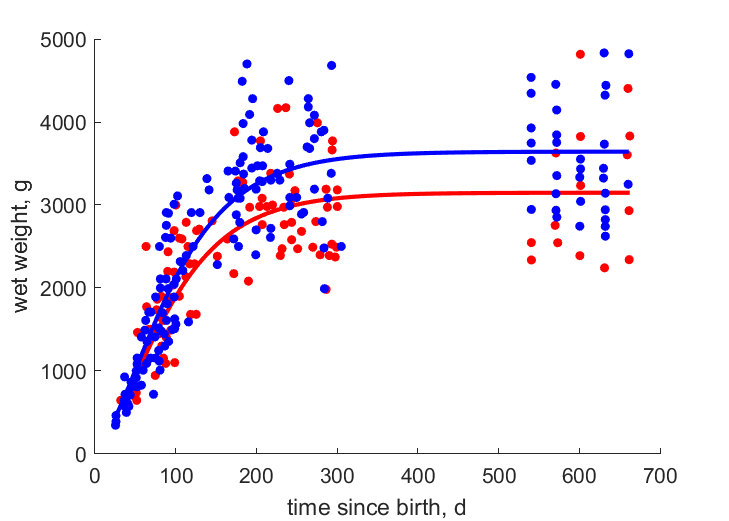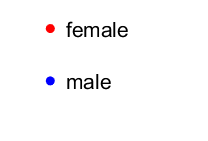Predictions & Data for this entry
| Model: stx | climate: Dfc, ET | migrate: | phylum: |
| COMPLETE = 2.5 | ecozone: TH | food: bxM, xiCva, xiCvm, xiSv | class: |
| MRE = 0.043 | habitat: 0iTht | gender: Dg | order: |
| SMSE = 0.010 | embryo: Tv | reprod: O | family: |
Zero-variate data
| Data | Observed | Predicted | (RE) | Unit | Description | Reference |
|---|---|---|---|---|---|---|
| tg | 52 | 51.85 | (0.002832) | d | gestation time | AnAge |
| tx | 51 | 51.57 | (0.01117) | d | time since birth at weaning | AnAge |
| tp | 304 | 306.2 | (0.00736) | d | time since birth at puberty | AnAge |
| am | 5950 | 5937 | (0.002141) | d | life span | AnAge |
| Wwb | 70 | 70.2 | (0.002828) | g | wet weight at birth | AnAge |
| Wwi | 3030 | 3148 | (0.03896) | g | ultimate wet weight females | PresNils1995 |
| Wwim | 3600 | 3643 | (0.01197) | g | ultimate wet weight males | PresNils1995 |
| Ri | 0.02466 | 0.02448 | (0.007006) | #/d | maximum reprod rate | AnAge |
Uni- and bivariate data
| Data | Figure | Independent variable | Dependent variable | (RE) | Reference |
|---|---|---|---|---|---|
| tW_f |   | time since birth | wet weight | (0.182) | PresNils1995 |
| tW_m |   | time since birth | wet weight | (0.1609) | PresNils1995 |
Pseudo-data at Tref = 20°C
| Data | Generalised animal | Vulpes lagopus | Unit | Description |
|---|---|---|---|---|
| v | 0.02 | 0.1028 | cm/d | energy conductance |
| kap | 0.8 | 0.9032 | - | allocation fraction to soma |
| kap_R | 0.95 | 0.95 | - | reproduction efficiency |
| p_M | 18 | 294.4 | J/d.cm^3 | vol-spec som maint |
| k_J | 0.002 | 0.002 | 1/d | maturity maint rate coefficient |
| kap_G | 0.8 | 0.8007 | - | growth efficiency |
Discussion
- Males are assumend to differ from females by {p_Am} only
- mod_1: males have equal state variables at b, compared to females
Acknowledgment
- The creation of this entry was support by the Norwegian Science Council (NFR 255295)
Bibliography